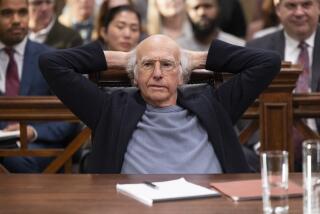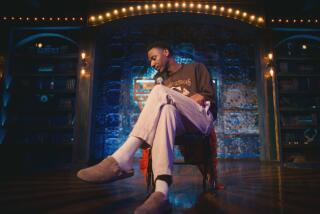Critic’s Notebook: Matt LeBlanc gets to be himself, sort of
David Nelson, who died on Jan. 11, was best known for playing a person named David Nelson on a television series that also starred his parents, Ozzie and Harriet Nelson, as people named Ozzie and Harriet Nelson, and his brother, Ricky, as Ricky Nelson.
What’s in a name? In this case, much. From the actor’s point of view, there may be no difference between playing a character who is similar to yourself and someone who is supposed to be you, but the use of a real name sets in motion interlocking wheels of identity, authenticity and artifice; it adds a kind of conceptual depth. If the Nelsons had been called the Johnsons or the Joneses, their show would have seemed a crucial hair less lifelike. The family’s unforced, even amateur rhythms, amplified by our knowledge that they are who they say they are, is what allowed “Ozzie and Harriet” its uniquely laconic naturalism.
It was common on radio, where “Ozzie and Harriet” began, for stars to play themselves. On “The Jack Benny Show” the “plot” of any given episode was, in essence, the enactment of the episode. “Benny” was an inspiration, years later, for “It’s Garry Shandling’s Show,” a sort of Cubist sitcom that limned its concocted realities from every conceivable angle. Shandling investigated similar ideas on “The Larry Sanders Show,” where various actors and musicians played counterpoint to their public selves. “Sanders” in turn begat Ricky Gervais’ celebrity-skewering “Extras,” where Ian McKellen gave idiot advice on acting (“What I do is pretend to be the person I’m portraying in the film or play”) and Coldplay’s righteous Chris Martin begged a guest spot on a sitcom: “It’d be good, I could play myself.”
It’s almost a given that show business paints its self-portrait in pustular shades of Dorian Gray. Happy to look bad are Louis C.K., of the brilliant self-referential sketch-com “Louis,” and Larry David, whose “Curb Your Enthusiasm” went way beyond meta when it became the platform for a “Seinfeld” reunion. With the “Seinfeld” cast playing both themselves and the characters they used to play, it provided a kind of surrogate second finale to that sitcom that was both a fictional and actual episode of “Seinfeld.” It hurts my head just to think of it.
A similar looking-glass dynamic animates “Episodes” on Showtime, in which Matt LeBlanc, from “Friends” and “Joey,” portrays Matt LeBlanc, from “Friends” and “Joey,” as the troublesome star of a poorly remade British sitcom. For the bulk of his career, in two separate sitcoms, LeBlanc has played a single character, the sweet and more than slightly dim Joey Tribbiani, whose sweetness, if not his dimness, one can easily believe is LeBlanc’s own. Here he’s not only playing against well-established type, he’s playing against the person we imagine him to be. Cast as a negative image of himself, a coldly charming Hollywood predator, he paradoxically gets to stretch.
It’s a smart move that says, first, “I am a good sport, secure enough to play this dark inversion without fear for my career or reputation.” In fact, it’s the sort of thing that bolsters a career or seals a reputation: Notwithstanding that there are jokes in “Episodes” that play off LeBlanc’s unspectacular post-”Friends” work life, unimportant people are not asked to play themselves on television.
In addition, the altered reality makes “Episodes” more “interesting” out of the box than Courteney Cox’s current series or Matthew Perry’s coming one, though her “Cougar Town” is good and his “Mr. Sunshine” looks like it might be. Indeed, “LeBlanc as LeBlanc,” while it does not demand a Times Square billboard, is the dependable conceptual thread on which the series hangs. Without him — or with him as some entirely fictional actor, minus the ironic resonance — all that remains is an occasionally amusing and completely conventional swipe at the American TV industry.
Something of the reverse is at work with another other class of people employed to represent themselves on television: the non-actors of reality TV, whose paraded pathologies are only interesting if we regard them as authentic, even as we know or should know by now that the reality they inhabit is simplified and manipulated. Where the professional actor’s job is to flesh out the suggestions of a character into a persuasively rich human being, so that we imagine depths not present on the page, the producers, casting directors and editors who craft reality TV refine actual people into characters, less complicated but more dramatically convenient than their actual selves.
We watch both sorts of performances with a kind of double consciousness, taking in the player and the play in a single bite; even as the flavors mingle, they remain distinct. Actors always play themselves in this sense: There is a Streepness to whomever Meryl Streep pretends to be. But when the name on the part is the name of the performer, a funhouse mirror comes down between them, reality gets happily bent, and a different kind of truth bounces back at us.
More to Read
The biggest entertainment stories
Get our big stories about Hollywood, film, television, music, arts, culture and more right in your inbox as soon as they publish.
You may occasionally receive promotional content from the Los Angeles Times.







